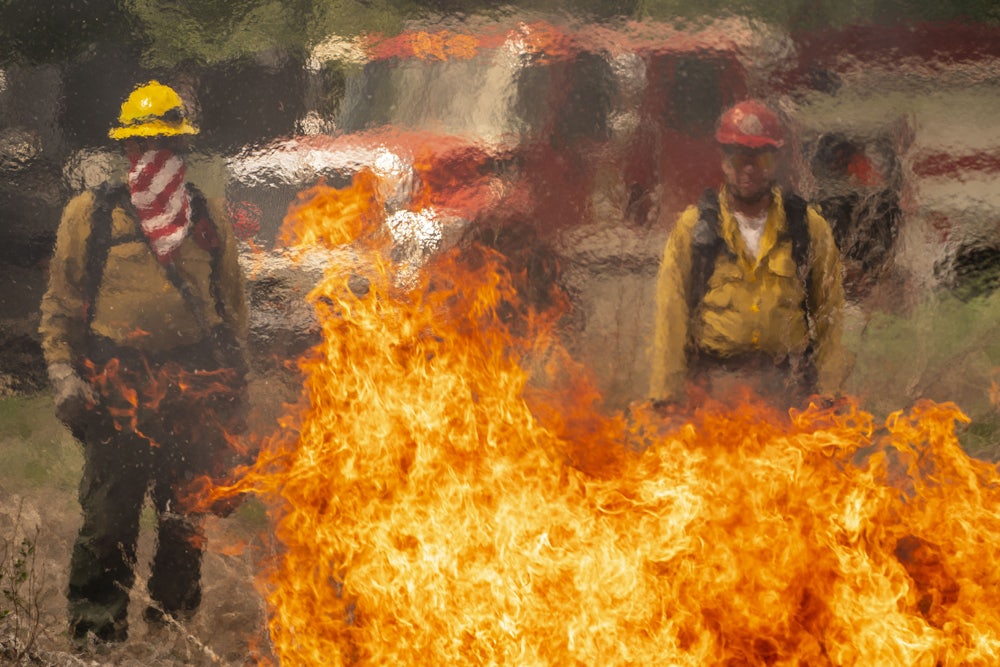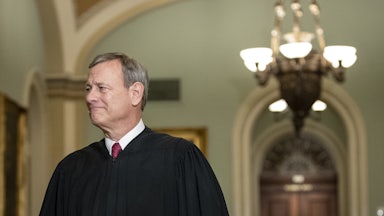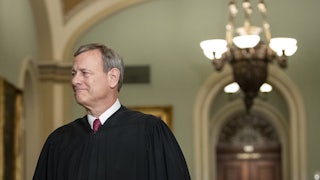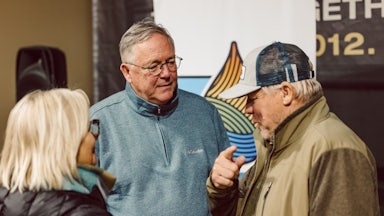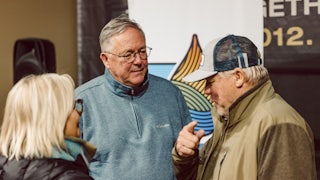Last week, Republican Senator Mitt Romney of Utah offered the meekest of excuses when asked why conservative leadership in the Senate is fighting to keep crucial climate policies out of the infrastructure package being proposed by the White House. Romney said measures “related” to climate, like carbon capture and nuclear power, are indeed being included and then tellingly added that “the Democrats’ agenda on climate change” would have to be enacted separately.
Consistency on climate is not Romney’s strong suit—a decade ago, in the lead-up to the 2012 presidential election, Romney did his best to sidestep the climate crisis at every turn and play up his coal and fracking bona fides, at one point commenting during a campaign speech, “My view is that we don’t know what’s causing climate change on this planet.” He has since adjusted his position, becoming one of the early members of his party to accept climate science publicly and, in 2019, joining the bipartisan Senate Climate Solutions Caucus. Climate is now listed on the senator’s website as being among his top three concerns as an elected official. But as the debate over the infrastructure package has proven, there’s always been a hard limit to his theoretical concern. And the cost of Romney’s reticence is being paid not just by the people back home in Utah but by everyone who calls the West home.
The American West currently faces interlocking drought and wildfire threats of unprecedented scale. And Republicans in the West are caught in a disturbing cognitive dissonance. Of the seven Western Republican senators (not including the two from Alaska), Romney is the closest to acknowledging the urgency of climate change: The others range from casual apathy to outright denial of human-induced global warming. The question that will face the West for every election—and wildfire season—from here on out is how long the region can survive while empowering a party blocking the policies that could help address the crisis.
In a 2012 report on the projected effects of climate change, the U.S. Forest Service determined that “climate and fuels are the two most important factors controlling patterns of fire within forest ecosystems.” The report’s authors went on to explain that with each year of increasingly warm and arid conditions, the vegetation on the West’s forest floors goes through an expedited decomposition process that makes it more susceptible to catching fire. Because the forest floors of the West are only slowly being reintroduced to the longtime Indigenous practice of controlled burns, there’s currently a lot of excess kindling, or fuel, on the ground.
A superdrought, now in its second decade, has dried the region out to emergency levels. Rainfall in parts of California has halved, while states and tribal nations in both the lower and upper basins for the Colorado River are sprinting to the negotiating table to hash out how to divide their shrinking freshwater reserves. Meanwhile, summer is here and so too are the wildfires—18 have broken out in Wyoming since June 5, six more are burning in Utah, four more simmer in Colorado, and so on down the line.
The responses to the drought and the wildfires, including a recent seven-state water compact developed and agreed upon by nearly every senator in the West, are unsurprisingly bipartisan. After all, it is difficult, though not impossible, for politicians to ignore such overwhelming threats and continue winning elections. However, these are still largely reactive measures that are not designed proactively to address climate change in good faith. They merely alter and update our current systems to adapt to it.
This is where the climate deniers have drawn a firm line and become the proverbial tail wagging the dog. To address the underlying cause of these changes, the nation and the world need to tackle emissions: The West needs to shutter its remaining coal mines, and the country needs to speedily turn off the tap on the maze of oil and natural gas pipelines snaking their way across the land, halting the inland and offshore drilling operations they draw from. But thus far, all attempts to shut down even demonstrably unnecessary pipelines like Keystone XL and the Atlantic Coast Pipeline have been opposed by this Western bloc of Republicans; in 2012, Romney, speaking of Keystone XL, offered to “build that pipeline if I have to do it myself.”
There are no dependable conservative voices of climate realism in the West at the crucial Senate level. Senators like John Barrasso and Cynthia Lummis, of Wyoming, along with Romney’s Utah counterpart, Mike Lee, are lost causes—Lee, after all, is the person who stood on the Senate floor after lambasting the Green New Deal and seriously stated that “the solution to so many of our problems, at all times and in all places, is to fall in love, get married, and have some kids.”
Then there are the politicians who acknowledge the problem, act in selective spots to show voters they’re Doing Something, but ultimately block larger policies that could mitigate the worst of the ongoing drought and wildfire outbreaks. Idaho Senator Mike Crapo and Montana’s Steve Daines, for example, have both conceded that humans play a part in the changing climate, but they’ve both relied heavily on the excuse that what’s happening now is a product of the planet’s natural process in order to justify continued fossil fuel extraction. “To suggest that it’s human-caused is not a sound scientific conclusion,” Daines said in 2019, adding uselessly that “we need to ensure that we find policies that can be bipartisan and that also support Montana’s diverse energy portfolio.”
This is the song-and-dance routine that officials like Daines and Romney have spent years perfecting. If you were to sit down with them and ask general questions about their commitment to developing a sustainable energy model or protecting water sources, they would provide examples of bills they’ve voted on in the past and likely agree about the need to adapt to our planet’s limitations. But when the time comes for them to cast their vote, those generalities quickly give way to partisan fealty.
Daines has cast his votes in favor of carbon capture policies, introduced legislation for more thorough federal forest management approaches, and worked with then–Colorado Republican Senator Cory Gardner to reauthorize the Land and Water Conservation Fund. During a 2020 challenge for his seat by former Montana Governor Steve Bullock, Daines even doubled down on his profile as a climate-sensitive conservative to (successfully) win over moderate voters. Daines did this because, as Colorado College’s annual “State of the Rockies” report proved, the people of the West no longer think environmental issues can be separated from climate issues. Fifty-seven percent of Montana voters surveyed in 2020 called for immediate climate action, up 12 percent from 2011, and 84 percent responded that “issues involving clean water, clean air, wildlife and public lands” stand atop their lists in determining whom to vote for in an election.
This attitude is holding fast for voters across the West, which may partly explain why the majority of its senators are currently Democrats. But by operating in this gray area, Republican officials like Romney, Crapo, and Daines are able to get away with selling their limited climate actions during tight election years while regressing to the norm for the remaining five years of their term. Daines, the same official supposedly concerned about wildfire mitigation and carbon emissions, has toed McConnell’s line by denouncing the Green New Deal, lambasted the Paris climate agreement, and touted fracking as a viable alternative energy source. Daines also vociferously led the conservative campaign against Biden’s Interior secretary, Deb Haaland, claiming she “ignores science” because of past conservation-friendly positions on wildlife management and steadfastly opposes fossil fuels—this after Haaland said repeatedly in her nomination hearings that she recognized fossil fuel use would be unavoidable in the coming years.
The political issues that divide the West and explain the partisan makeup of the states, tribal nations, and the entire region will soon be either shaped or entirely overshadowed by the ongoing effects of the climate crisis. With water levels in the Colorado River dropping with each passing year, Arizona is slated for severe water cuts by 2022, as are the other states that rely on the river. But conservatives continue to hope voters will compartmentalize the crisis, as with any other political topic. When the water doesn’t flow out of the tap and the wildfire flames keep rolling closer, there will be excuses—lists of reason after reason why pursuing federal legislation that effectively curbed carbon emissions would have temporarily hurt local economies.
Two years ago, at a foreign policy speech given at Boise State University, Idaho Republican Senator Jim Risch was asked by a student in the crowd why it was that he never brought up the climate crisis. Risch couched his (fairly incoherent) statement in hypotheticals—“If it is as bad as the people that are on the edge of it say it is, I don’t know that there’s anything anybody can do about it,” he said. The United States, he continued, does more than its fair share, while impoverished people across the globe who have to burn their dinner over a rubber tire “don’t care about global warming.” Risch closed his answer by essentially shrugging his shoulders and telling the students, “I hope you’ll have the answer by the time we get there.”
Take a look at these pictures of the Lake Mead reservoir, snapped by Mark Renle of the Arizona Republic, and then reread Risch’s statement. There is no “by the time we get there” anymore. The imaginary, far-off marker of catastrophe the senator referred to is already here. From the rings growing around the Colorado River reservoirs to the acres seared by wildfire, the notion that the American West has any time remaining before it needs to take drastic action is no longer plausible. At this point, no one, regardless of party, claiming to represent the region should be standing in the way.
